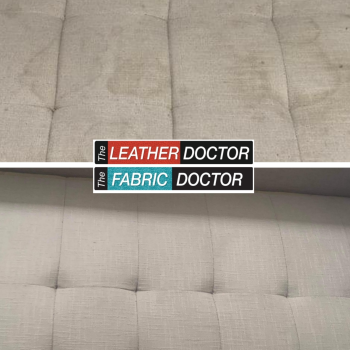A fabric lounge is a key piece of furniture in a household – it’s perfect for lying on to watch television, to relax on, to rest on, or even to eat on. But with so much time spent on a lounge, there is sure to be some damage sustained, to include the dreaded oil stain.
While some stains are easily removed from fabric furniture via upholstery fabric cleaning, an oil stain can be far harder to eradicate. Once it hits the spot, it can be there to stay unless you know the right techniques. So how do you get oil out of upholstery? What upholstery fabric cleaning or upholstery fabric repair techniques are available to remove stains from fabric furniture? Next time you find an unwanted stain on your fabric furniture, try some of these upholstery fabric cleaning tricks below – and restore your fabric upholstery to its former self!
Upholstery fabric cleaning – DAB, DON’T RUB!
One of the most common mistakes when trying to quickly remove an oil stain is rubbing too hard. We all know that feeling when a hot chip ends up on your clean, white couch instead of in your mouth – you panic! You grab the closest paper towel and rub the stain as hard as you can.
However, this can actually make the problem worse. Instead of reducing the stain, rubbing will only expand it. There is also the potential to push the oil further down into the fabric, causing the stain to really set in.
The trick on how to remove an oil stain from a couch is to dab, not rub. Still reach for the trusty paper towel, but go gently. Each soft dab will initially help absorb excess oil, applying only minimal pressure, and will do less damage to your fabric in the long run. In the case of dabbing vs rubbing, less really is more!
Fabric upholstery protector is also a great tool to use as a barrier to help stains from setting in. Regular applications are quick and easy and can prevent a world of future damage!
Fabric upholstery cleaning – detergents
After soaking up oil with a paper towel, the next tactic in your battle in upholstery fabric cleaning can be a targeted use of detergent. It may be an everyday kitchen cleaner, but its power is how it breaks down oil. Just like on your dirty dishes, water is not enough to get rid of grease – you need detergent to add the firepower.
However, you don’t need too much detergent on an oil stain. While it can be tempting to lather it on, you only need a drop or two to get the job done. It depends how big the stain is, but most experts recommend mixing just a few drops in a cup or two of warm water. This will create a mild soapy solution, which you apply with a sponge. Too much detergent can cause damage and create water marks, particularly to more delicate fabrics.
Once you’ve made your solution, it’s simply a matter of dabbing it onto the oil stain. Use the same gentle dabbing approach as mentioned above.
Unless you have an extraction machine, be wary of using too much liquid though! You don’t want to saturate your fabric, causing water marks, or leaving foams and fabrics wet so that they develop mould or mildew.
If you find that you have got to this point, contact a professional fabric cleaning company such as The Fabric Doctor to assist in removing water marks, over saturation or a build-up of detergent.
Fabric upholstery cleaning – Bicarb Soda
We’ve talked about how to remove an oil stain from your sofa, but what do you do if you realise you’re out of detergent? You still need to break down that grease. Luckily there is another upholstery fabric cleaning step you can take – bicarbonate of soda! (or bicarb soda).
Bicarb soda works in two ways to help your fight. Firstly, it soaks up excess oil and secondly, it breaks down the oily compound in the same way detergent does. Once the bicarb soda has absorbed as much oil as it can, simply dab it away with a damp cloth.
Before you start to liberally apply bicarb though, test it in an inconspicuous area of the fabric furniture, to make sure that it will not affect the fabric finish or colour.
Call the experts!
When it comes to fabric upholstery repair and upholstery fabric cleaning there’s a limit to how much water to use – don’t use too much! While water is critical in the fight, you don’t want to saturate your stain. Too much water can backfire on you and can end up damaging some fabric, encouraging a stain to grow, or leaving you with substantial water marks.
The tips we’ve listed are just some of the ways you can approach fabric cleaning and fabric stain removal. But, if you’re still having trouble lifting that stain, give your local Fabric Doctor a call.
Upholstery professionals, like our team here at The Fabric Doctor, are experts in fabric upholstery repair, fabric stain removal and upholstery fabric cleaning. With specialised techniques and a wealth of knowledge, we can help you get rid of those nasty oil stains on your fabric upholstery, once and for all.
For a free quote on your fabric cleaning or fabric stain removal requirements, fill in a free quote form today!






